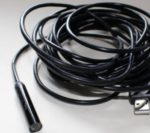 ECRI Institute’s annual list of patient safety concerns has been released. One concern missing from the list that has been a staple for several years is the infection risk associated with inadequate cleaning of flexible endoscopes. With the number of incidences being reported by hospitals and the associated changes to scopes being issued by the endoscope manufacturers, this omission is a surprising one.
ECRI Institute’s annual list of patient safety concerns has been released. One concern missing from the list that has been a staple for several years is the infection risk associated with inadequate cleaning of flexible endoscopes. With the number of incidences being reported by hospitals and the associated changes to scopes being issued by the endoscope manufacturers, this omission is a surprising one.
On the list this year is “Inadequate Organization Systems or Processes to Improve Safety and Quality.” This seems to be an all-encompassing view of the need to improve the patient safety culture at hospitals nation-wide. This is a view that has recently been echoed by The Joint Commission in a recent sentinel event alert.
As the executive brief by ECRI explains:
“Numerous studies show a link between error prevention and a culture of safety. Nevertheless, healthcare organizations have been slow to adopt all the necessary features of a high-reliability organization.
Root-cause analyses are vital, but Elizabeth Drozd, MS, MT(ASCP), CPPS, patient safety analyst and consultant, ECRI Institute, also recommends that organizations “be proactive rather than waiting until a patient is harmed.” Proactive strategies can be used to examine processes, identify what can go wrong, and make the process less vulnerable to error before mistakes can occur. Strong preventive strategies, such as standardization and automation, should be explored.
Leaders should support a “just culture” that emphasizes learning rather than blaming. Individual accountability must be balanced with organizational responsibility to design and improve systems to ensure safe care. Finally, all organizations should have an actionable quality and patient safety plan with high-level approval.”
Get access to the executive brief here: Top 10 Patient Safety Concerns for 2017
As hospitals look to improve their current quality systems and processes, they must look to standardize and automate as ECRI mentions. Automation systems such as iRIScope can help hospitals get better control of high-risk processes such as endoscope reprocessing by standardizing processes and automating many of the data collection workflows. Through a combination of increased scrutiny of their current processes and implementing new systems to increase standardization, hospitals will be well on their way to addressing this important safety issue.
